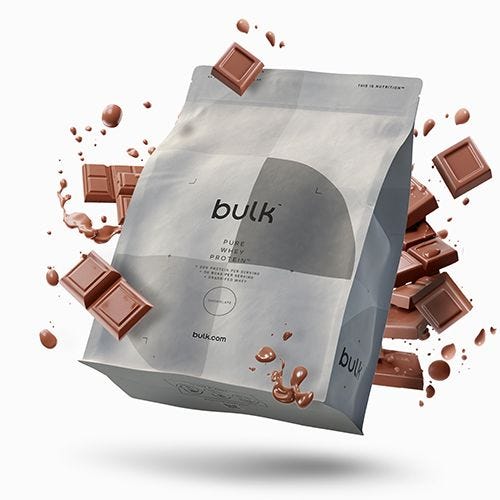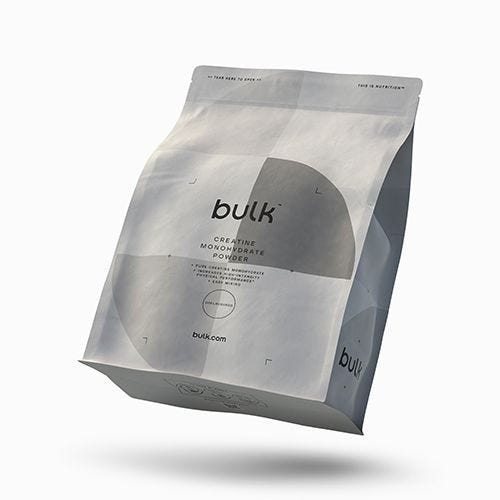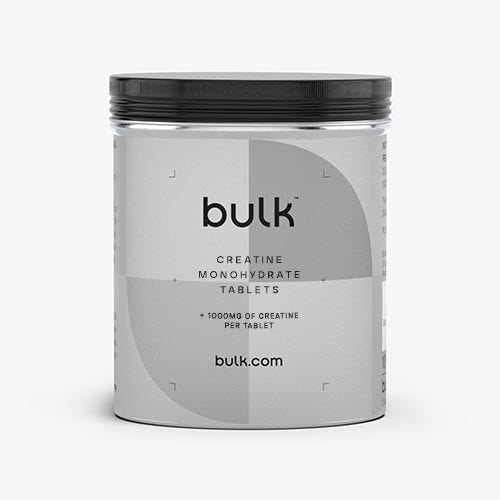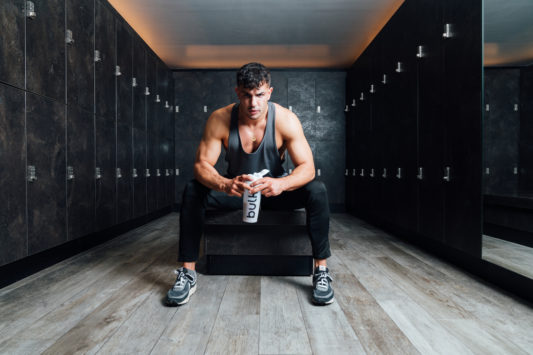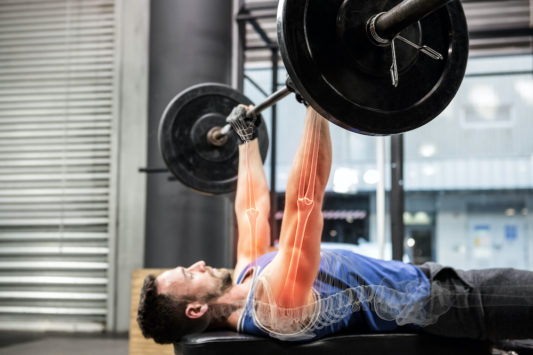Resistance training is essential for muscle growth. That’s a given. But supporting this with a healthy diet and the right nutrition is the only way to get those gains. There’s a lot of talk about what this looks like. So we’re here to clear the confusion.
With some insight from our in-house experts and qualified nutritionists, Abi Roberts (Applied Sports Nutrition MSc) and Hannah Lloyd (First Class MSc Food Technology with Nutrition), here we explain what a healthy diet for building muscle actually looks like.
How many calories do you need in a diet for building muscle?
To build muscle, the body needs to be in a calorie surplus consuming more calories than it burns on a daily basis. The exact number of calories required for muscle building depends on individual factors such as age, gender, height, weight and activity levels. But a general recommendation is a surplus of 250-500 calories per day above maintenance level [1].
It’s important to monitor weight changes and adjust calorie intake accordingly to avoid excessive weight gain, which can hinder muscle growth and overall health. Ultimately, you want to find what feels right for you.
For beginners, muscle building may be possible on maintenance calories due to initial muscle adaptation to resistance training. But calorie intake may need to be adjusted as progress is made.
What’s the best macronutrient ratio for muscle gain?
Macronutrients (or macros) are the three components of all foods: protein, fats and carbohydrates. Every food you eat will contain one, two or even all three of the macros.
For building muscle, the general guidance for the best macronutrient ratio is in this range:
- 55 – 60% carbohydrates
- 25 – 30% protein
- 15 – 20% fat
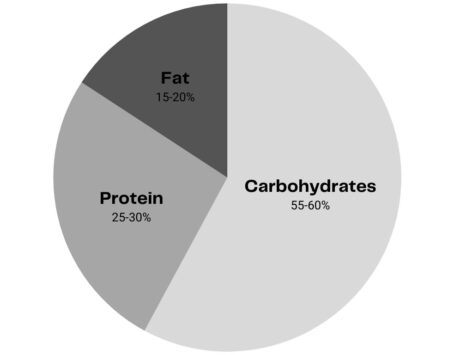
Carbohydrates
Unlike calories, that can fluctuate depending on goals, your macronutrient ratio should stay fairly consistent when trying to build muscle.
A good place to start when trying to build muscle is with rich sources of fibre and carbohydrates. This helps keep your body fuelled for big workouts.
Protein
As most of us know, protein plays a vital role in building and repairing muscle tissue, supporting immune function and maintaining a healthy metabolism. Muscle protein synthesis (MPS) is stimulated by resistance training and is further stimulated by protein ingestion [1]. This means that to maximise muscle repair and hypertrophy following training, getting protein in is crucial.
Foods high in protein include meats like chicken, beef and fish, as well as eggs, dairy products, nuts and soya.
Fats
As the NHS says, ‘a small amount of fat is an essential part of a healthy, balanced diet. Fat is a source of essential fatty acids, which the body cannot make itself. Fat helps the body absorb vitamin A, vitamin D and vitamin E. These vitamins are fat-soluble, which means they can only be absorbed with the help of fats’’
In terms of building muscle, fats are needed to increase the production of growth hormone (GH). GH is responsible for stimulating growth in tissues by increasing the amino acid uptake and protein synthesis in the cells.
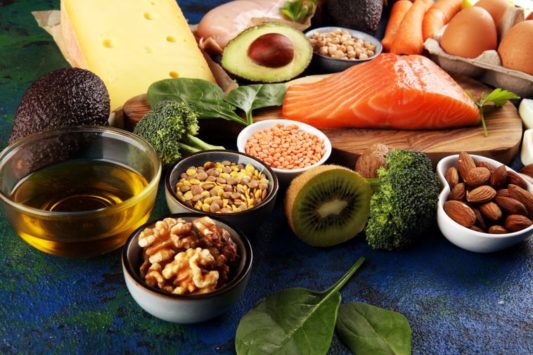
What are the best foods for muscle gain?
To support muscle growth, it’s important to consume a balanced and varied diet that includes plenty of protein and meets your daily energy requirements. Some foods that can help boost calorie intake, while also providing important nutrients, include:
- Chicken
- Beef
- Soya (tofu)
- Fatty fish
- Nuts and seeds
- Dried fruit
- Avocado
- Cheese
- Whole grains
- Oils
- Full-fat dairy products
Aside from the healthy calorie-dense foods that you can include to help boost your calories, protein is also a key component in muscle growth. So incorporating plenty of lean meats, dairy products and legumes is a must.
For vegetarians and vegans, soya is your friend because it holds a complete amino acid profile, including a high amount of BCAAs.
Which foods should be limited for muscle growth?
While it’s important to consume a balanced and varied diet to support muscle growth, there are some foods that should be limited in order to optimise your progress. Some examples include:
Highly processed foods
When consumed in excess, highly processed foods often contain added sugars, unhealthy fats and other additives that impact overall health. This could hinder muscle growth.
Alcohol
While having a couple of beverages now and then is typically harmless, excessive alcohol intake can interfere with muscle recovery and repair. If you want to learn more about alcohol and muscle growth, see our blog on the subject.
High-sugar foods and drinks
Consuming too much sugar can lead to excess, poor-quality calories, which may undermine muscle growth. You want the majority of your calorie intake to come g from healthy, nutritious sources.

What about supplements for muscle gain?
Supplements are a great way to boost our nutrition alongside our day-to-day diets, especially if your goal is to stay within a certain range of calories or if your protein goal is particularly high.
For example, for someone whose goal is to become lean and muscular, they will be limiting their calorie intake to a certain extent while still consuming a high amount of protein. Here are some of the best supplements for muscle growth.
Protein Powder
Protein powder, such as Informed Whey, is a great option to incorporate into your diet in this case. Protein powders are typically low in calories, fat and sugar but they still deliver a high amount of good quality protein; the perfect supplement to complement a healthy diet.
On the other hand, if you’re looking to really increase your muscle mass and are therefore eating a surplus amount of calories, a Mass Gainer protein powder is a great option to add additional calories and protein to your diet.
Creatine
Creatine has been suggested to enable us to continue exercising at a higher intensity for longer by increasing ATP synthesis. This suggests that it’s helpful in pushing yourself to get in those extra reps while challenging your muscles, lending itself useful to building muscle.
To really make the most out of your gym sessions, your diet must be the top priority to get the results you want. A diet that combines nutrient-rich foods with a varied fitness routine and supplements is a great way to fuel your body for muscle gain.
Related Products
Sample diet for building muscle
This is a ~2,500kcal nutrition plan with ~150g protein.
Breakfast
- 3-egg omelette with spinach, mushrooms and cheese
(approx. 320 calories and 24g protein)
- 2 slices wholegrain toast with avocado spread
(approx. 260 calories and 7g protein) - 1 small banana
(approx. 90 calories and 1g protein)
Mid-Morning Snack
- Greek yoghurt with berries and almonds
(approx. 220 calories and 18g protein)
Lunch
- Grilled chicken breast with roasted sweet potato and steamed broccoli
(approx. 450 calories and 42g protein) - Wholegrain pitta bread with hummus
(approx. 150 calories and 6g protein) - 1 apple
(approx. 95 calories and 0.5g protein)
Mid-Afternoon Snack
- Protein shake made with almond milk and banana
(approx. 300 calories and 25g protein)
Dinner
- Grilled salmon with quinoa and roasted Brussels sprouts
(approx. 520 calories and 40g protein) - Large green salad with mixed vegetables and balsamic dressing
(approx. 100 calories and 1g protein)
Evening Snack
- Cottage cheese with sliced peaches and chopped walnuts
(approx. 200 calories and 15g protein)
Total calories: 2,300-2,500 kcal
Total protein: 150-170g
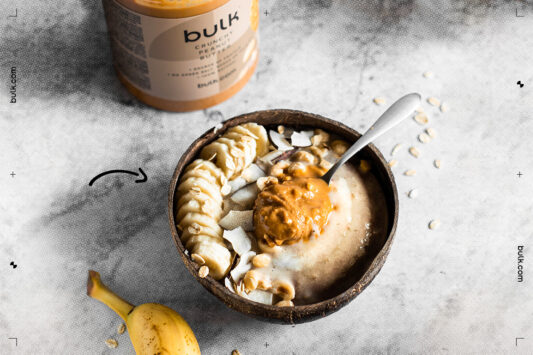
Frequently Asked Questions
How important is diet for building muscle?
Diet is essential for proper recovery from training. Once you have broken down the muscle cells via resistance training, the rebuilding process of MPS (muscle protein synthesis) must be fuelled. A high-protein diet is needed to ensure proper recovery and rebuild of the muscle tissue.
If muscle is a wall and bricks are muscle cells, training smashes the bricks down, diet and nutrition help to rebuild the wall and add new bricks.
Is diet more important than exercise for muscle growth?
Nutrition is just as important as physical activity when it comes to muscle growth. Optimising our diets to our specific goals provides us with the right fuel our bodies need during tough workouts, shaping muscle growth.
Good nutrition is key to seeing the results you want. The best way to approach this is by hitting your nutrition targets, whether that be a protein goal or staying on track with a calorie surplus.
Is a low-carb diet good for gaining muscle?
Low-carb diets are typically used for weight loss rather than gaining muscle. However, a combination of a low-carb and high-protein diet can be used for muscle gain, which is often the approach bodybuilders use in the ‘cutting phase’ of their regime. That being said, if muscle gain is the goal, dropping an entire food group is not a good idea because it makes it more difficult to maintain a calorie surplus.
Carbohydrates play an important role in fuelling our bodies for physical activity. Instead of avoiding carbs or limiting them, focus on choosing your carbs more for their nutrient profile and how they can be utilised in fueling your body. A good way to do this would be to consume foods rich in fibre and slow-release carbs.
Is the keto diet good for muscle gain?
Generally, the keto diet is not recommended for muscle gain. This is because it’s a low-carb, high-fat diet that is typically utilised for weight loss and other potential health benefits.
While some people may be able to build muscle on the keto diet, it would be much more challenging, and not to mention sub-optimal, because carbohydrates are the key source of energy for our muscles during resistance training and high-intensity exercise. Keto may also limit certain food groups that are required for optimal muscle growth and recovery.
Summary
When it comes to building muscle, you have to give your body the right fuel. That means hitting a calorie surplus to support muscle growth and finding your sweet spot for the best macronutrient ratio. Protein, healthy fats and complex carbs are your best friends.
A varied diet of nutrient-dense foods like lean meats, fish, dairy products, whole grains, pulses and plenty of fruits and veggies is what you’re looking for. Remember, when it comes to the best diet for building muscle, it’s all about balance, dedication and consistency. We believe in encouraging everyone to find their passion for exercise. For more fitness content, check out @bulk for recipes, ambassador workouts and gym tips. Join our community of fitness lovers and foodies.

